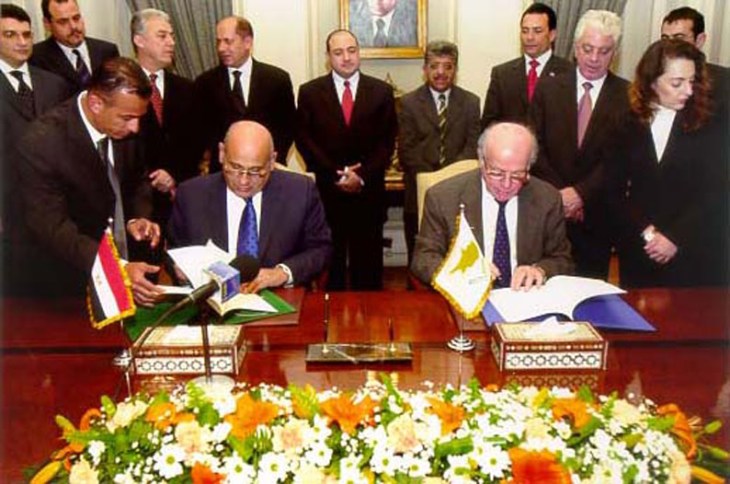Caption: The Minister of Commerce, Industry and Tourism of Cyprus Nicos A. Rolandis and the Foreign Minister of Egypt Ahmed Maher, sign the Cyprus-Egypt EEZ Agreement in Cairo on the 17th February 2003.
By NICOS A. ROLANDIS
Nicos Anastasiades was twice unlucky in the framework of his success:
- In 2013 he took over the helm of Cyprus, whilst the economy was in chaotic doldrums – and he managed to revive it.
- In 2018 he must handle the Cyprus problem and energy issues, which are in a state of collapse.
- As for 2013 (economy) the president was not responsible at all for whatever had preceded his term of office.
- As for 2018 (Cyprus problem, energy) the wrong decisions and the disastrous failures of duty had happened before the year 2013. However, the president might have been a little more cautious during the 2013-2018 period.
There were good opportunities to solve the Cyprus problem in the past decades (Anglo-American-Canadian Plan 1978, Indicators 1983, Consolidated Documents 1985). Some of us supported very strongly the plans. But the populists and cheap charmers prevailed.
There was an opening for the hydrocarbons (my proposal of 2006 which was viewed positively by Mehmet Ali Talat). But the populists and cheap charmers prevailed again.
It seems that the DNA of many Cypriots is in line with the blood test of the charmers. After all, the loss of one third of Cyprus in 1974 was not fortuitous. And it is not fortuitous that we have been following the same course, the same line of thought the same blunders since then.
Truly, where are we today? Where is Cyprus and what about the surrounding area, where fate, history and geography has placed us?
- In Cyprus:
We are faced with a fully deadlocked Cyprus problem: The Turkish Cypriots will not negotiate unless we discontinue drilling for hydrocarbons in the sea. We will not negotiate unless Turkey stops threatening. So, an absolute impasse exists.
Dangers in the energy sector:
- The Government persists with its hydrocarbon activities.
- Turkey threatens in a very aggressive manner, that she is going to seek the implementation of her rights (the way she perceives them) and also the rights of the Turkish Cypriots to the bitter end. Nobody knows what sort of action the unpredictable and ruthless Erdogan may take. He has warplanes, navy, tanks, hundreds of thousands of soldiers at his disposal. Nobody knows how he may start off and how he may cease his activities.
- Turkey has announced that she will send her own drilling platform into the Cyprus EEZ and start pumping the natural gas of Cyprus (who is going to stop her?)
- In our area:
Afrin has fallen to the Turkish troops. Thousands have died and an unbelievable pillage and brutality have taken place. In Syria approximately 500.000 people have perished thus far in the civil war. Eastern Ghouta is in ruins. Five million Syrian refugees are deprived of food, medication and the necessaries of life. A Turkish invasion into Iraq is in the wings. The problem of the Middle East may explode at any moment. The relations between Israel and Lebanon may deteriorate because of EEZ disputes. The Aegean may accidentally blow up.
- The strong and the mighty of the world simply disseminate their wishes for an improvement in world order. Some of them are even prepared to tolerate the carnage. First and foremost, they look after their own interests. In the case of Cyprus, they recognise our rights but at the same time they also recognise the rights of the Turkish Cypriots. From time to time they verbally condemn Turkey and her offensive ways. They may eventually render the accession of Turkey to Europe more remote. However, unfortunately for us, the more is Turkey distanced from Europe, the more the solution of the Cyprus problem becomes distant and doubtful.
So, what should we do in this messy situation?
If we and Turkey continue with the tug of war and we pull the rope at opposite ends, unless there is a substantive (and not a simply verbal) international support, the weak one will lose; and we are the weak ones.
In the circumstances, my opinion is as follows:
- Although I fear that it may be too late for the Cyprus problem, because the gap has grown and the differences and problems are piled up (all good opportunities are gone).
- Although we have missed the opportunity to safeguard our own share in the natural gas (my 2006 proposal) before the claims of the Turkish Cypriots grew bigger and bigger.
- I believe that the talks with the other community is the only remedy left. Without a solution of the Cyprus problem and if the controversy goes on, there will be no stability in Cyprus. We may not manage to even touch one cubic foot of gas. That was the position of Glafcos Clerides too. When I came back from Cairo, where I signed the Cyprus-Egypt EEZ Agreement on the 17th February 2003, Clerides told me in the presence of Pantelis Kouros: “Nicos, you may now place this Agreement in the strongbox of your Ministry, until the Cyprus problem is resolved.
Twenty years have gone by since I first started the hydrocarbons efforts on the 31st March 1998. Their exploitation will take another 5-6 years. I would suggest that subject to a reservation of all our rights we put on hold all our hydrocarbon activities for nine months, that is until the 31st December 2018 (a 9- month moratorium). In parallel all the unlawful Turkish actions (drilling platform, threats, etc) will have to cease as well. This should happen in a concerted action with the UN Secretary-General, so that he may recommence the dialogue on Cyprus, which is at present fully deadlocked. If the problem of Cyprus is thus resolved the hydrocarbon issue will also be fully addressed, because it will become part of the duties of the Federal Government, as already agreed.
The above 9-month moratorium will not affect in real terms the hydrocarbons issue of Cyprus, in respect of which 20 years have already elapsed and there is another 5 years to go for their exploitation. The 9 months will give another opportunity to Cyprus.
An arrangement of the above nature will not constitute a retreat on our part. It will be an effort to address, in an effective manner, the big problems of Cyprus. On the contrary, if we do not take the necessary action now, we may pay a very heavy price in the future, followed by national humiliation. This is what unfortunately happened when we lost 37% of our territory in 1974, when we pursued the S300 missiles and threw into the dustbin $270 million in 1998, when we rendered the Cyprus problem almost intractable through the passage of time and nowadays with the possible loss of our natural gas.
Let us give Cyprus another chance.
POLITICAL BUREAU
Minister of Foreign Affairs 1978-1983
Minister of Commerce, Industry & Tourism 1998-2003
Member of the House of Representatives 1991-1996
President of the Liberal Party 1986-1998
Vice-President of Liberal International 1994-1998
27 March 2018







